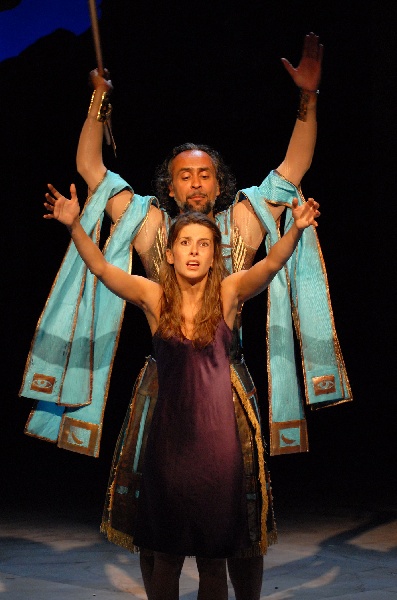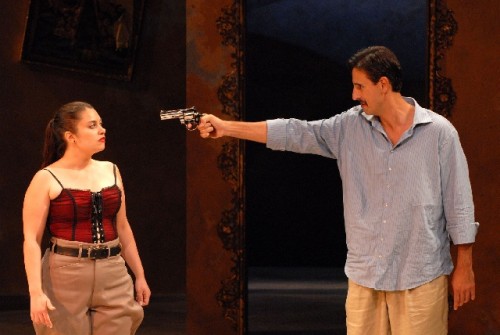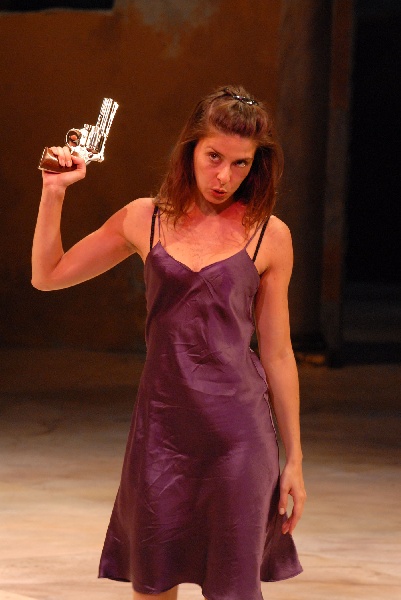Comedy by Cusi Cram Premieres at Nikos Stage
Mestizo Culture Explored by Williamstown Theatre Festival
By: Jane Hudson - Aug 25, 2006
Lucy and the Conquest begins with a loss. Lucy Santiago (Jeanine Serralles), star of TV’s ‘Beach Detectives’, is on her way back to her father’s country, Bolivia. She has been fired from her series for refusing to wear a ‘yellow bikini’, the significance of which, although sublimated in her current rage, become apparent as our heroine explores her roots. She feels that her character, Hunter Nevins, a forensic psychologist with a PhD, wouldn’t wear such a debased costume.
When she bids her mother good bye on her cell, it feels like there is nothing beneath her, no ground. She calls herself a ‘cloud’ at one point. This is only exacerbated by the fact that her relationship with her boyfriend has also collapsed, ‘imploded’. The affect of free floating, dreaming, offering no resistance, and forgetting can be felt all throughout the play.
Once in Bolivia, in the ruins of the old family estate, we come to learn about all the secret inter-relations, expectations, disappointments and rages that characterize this ‘forgotten’ family. We are led to an understanding of the mestizo culture, spawned by the mixing of European and Indian peoples, the brutality and loss of identity that comes as a consequence. And the longing for an ‘inversion’ of history so the ‘body’ of the culture can be restored in its rightful place.
Staged in the new ’62 Theater and Dance Complex in Williamstown, the technical sophistication of this production is impressive. The intimate Nikos Stage is outfitted with the latest in stagecraft. Using the full range of the thrust stage, the considerable ‘fly space’ from which major elements of the set and ‘magical’ objects float (Mimi Lien, Sets), and a course of area lighting that defines the variable time signatures of the narrative (Charles Foster, Lighting), and the soundscape that pushes the psychic space so effectively (Robert Kaplowitz, Sound) the ‘machine’ of this play works flawlessly.
The emotional tone, that underlying gravity that pulls all the parties and their cultures together, is brought to us through a series of signs. Lucy, our heroine (Jeanine Serralles) plays her neurosis as whiney and shrill until she ‘becomes’ Hunter Nevins, her TV alter-ego. Lila (Vanessa Aspillaga), the maid’s illegitimate daughter, who wears a military tunic and jodhpurs and wields a gun, strides about as a caricature of her hero, Pisarro. She is all broad gesture and volume. Spirited and firey, the archetypal Latina warrior. Pacha (Socorro Santiago), the aged matriarch carries her age on bow legs. El Gringo (Julien Acosta) is hang-dog in his sexual compulsions, desperate and smarmy. Inca Man/Juan Ricardo Santiago, the patriarch (Bernard White), appears as sword wielding ancient and grey-suited diplomat. David Ross’ pathetic boyfriend Tommy and ridiculous Drew Gold, Hollywood agent, are ciphers at best.
Seeing as we’re dealing with a class struggle where the main character only sees her own personal neurosis at issue, lets’ look at the hierarchy.
In Hollywood: the studio managers, the producers, the agents, the writers, the advertisers and finally the actors. Our heroine, Lucy Santiago, is allowing herself to be used for the prurient ends of the entertainment industry. She has become the Bat Girl/Charlie’s Angel/Christina Aguilera pop star who pops pills and exposes her ‘ta-tas’ for gain. Her love life is all bent out of shape, extreme and unfeeling (she sports a black eye after an S&M session gone bad). And, whatever she had as a legacy has been forgotten in the media haze…until she is fired. Given that our culture is so psychologically oriented, we might try to find the trauma at the center of her problems. And, sure enough, as the play progresses we do learn of the triggering event. But true to the political exegesis of the writing, we are led through a more complex cultural dynamic to the trauma of an entire people, to an event so strange and poignant that one can only ask, as Inca Man does, ‘what if had been different?” What if the people hadn’t panicked at the sight of their god/king brought down?
This is where the production falls short. What could have been a thoughtful exploration of time and its secrets and distortions, ends up as a confused, rhetorically stilted farce. It should be funnier (even though there were some guffaws from the crowd, I didn’t laugh out loud once), or more serious (I think of the Irish plays of Synge for instance). Mostly, the writer brings a lot of post-colonialist critique to bear that, although relevant historically, robs the play of its humanity. Curiously, the most effective scenes, in the second act, are those when Lucy has her psychotic break and becomes Hunter Nevins.
This is like TV, all style and sight-gag. It’s choreographed pretty well, and speaks a language that is the most contemporary of the play.
Maybe theater, it its forced projection, has lost its ability to move us ‘for real’. We have gotten so used to the twitching cheeks and meaningful glances of actors like Tom Cruise and Angelina Jolie, that we can’t believe the broader gestures of the live stage.



